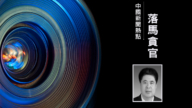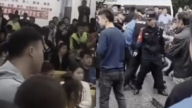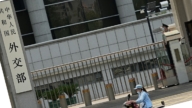【新唐人2012年12月26日讯】西安“9‧15”反日游行中,砸穿日系车主颅骨的蔡洋一直认为:他是在爱国、在抵制日货。但蔡洋殴打的对像不是日本人,而是一名50多岁的中国人。为什么会出现这种现象?英国媒体指出,这是因为中共的爱国教育扭曲了中国人的世界观。
英国《金融时报》24号的文章“爱国主义教育扭曲了中国人的世界观”,写道:蔡洋的母亲,为21岁儿子用自行车锁殴打一名开丰田车的车主时,辩解说:“学校一直向学生灌输这样的观念,那就是日本是个邪恶的民族。而这些日子你一打开电视机,大多数节目和连续剧都是抗日故事,你怎么能不恨日本人呢?” 文章表示,“她的话有相当的道理”。
大陆学者巩胜利:“老百姓把反抗日货、反对日本占领钓鱼岛事件,成了老百姓所有人泄愤的一种方式,日本没有得到应有的反对,反而使中国受害不少。”
《金融时报》还指出,自1989年的天安门事件,以及前苏联与东欧社会主义阵营解体后,中共发起一场延续至今的新的爱国主义教育运动,也就是:有选择的讲述历史,强调外国侵略者侵占中国领土时的凶狠残忍,替代了之前的以“阶级斗争”为主的思想教育运动,对中国统治者的错误缺点避而不谈,就是用遭受西方侵略的历史,来培养年轻人的民族主义精神。
巩胜利:“它的教育是偏颇的,比如说他的电视教育,一个是斗争、一个是暴力,还一个是血腥,电视里面充斥着这种你死我活的这种战争的教育。”
大陆学者巩胜利还指出,共产党执政的理念还是“占山为王”时的思想,就是:用暴力维持、暴力执政,暴力对待。所以公民,不讲宪法、不讲法制,共产党在一切法律之上,教育也是走极端,教人迷信暴力。
《金融时报》指出,这种“爱国教育”的后果是,在世界其他国家眼中,中国是一个强大到令人害怕的国家,它时常会欺负弱小国家。但在许许多多中国人的心中,他们认为中国仍然非常贫困、弱小、并遭人欺侮。
事实上除了朝鲜和巴基斯坦之外,几乎所有这些地区的重要国家,都与中国有领土争端,与日本领土争端最激烈。《金融时报》认为,这个月的日本大选,强硬派获得压倒性胜利,也使得中日局部冲突具有可能。
中国社科院24号在北京发布的《国际形势黄皮书》也承认,钓鱼岛问题不断升级,不能排除危机有进一步升级甚至爆发冲突的风险。
时事评论员朱柯明认为,中共宣传爱国主义、煽动民族主义,真正的意图不是领土的完整,而是中共的政权,领土随着形势的变化,随时可以被它当作礼物送掉。
时事评论员朱柯明:“很多领土是共产党主动出卖、出让给其他国家的,这一点他是不敢讲。出卖中国领土最严重、卖国最厉害的,那不就是江泽民吗?它在一个小小的岛上大做文章,在一个台湾问题上大做文章。实际上共产党自周恩来、江泽民、毛泽东出卖的外蒙古、中印边界、还有东北大面积的土地,那是几百万平方公里。”
1999年12月9号和10号,江泽民与俄罗斯政府签定了《关于中俄国界线东西两段的叙述议定书》,这一条文将中俄世代相争的领土拱手让给俄罗斯,同时承认了从中华民国到历届中共政府都拒绝承认的“中俄九项不平等条约”,永久性的断绝了后代子孙的讨还之路。那些领土面积约300多万平方公里,相当于100多个台湾。
采访/田净 编辑/宋风 后制王明宇
UK Media: Chinese Communist Party Patriotic Education Warps Chinese Worldview
During an anti-Japanese demonstration this
September in Xi’an, a man named Cai Yang
cracked the skull of a Japanese car owner.
Cai Yang asserted that he is being patriotic,
and was boycotting Japanese goods.
However, the object of Cai’s attack was not a Japanese
person but a was 50-year-old Chinese citizen.
How could this happen with today’s Chinese people?
UK media comment that this is a warped worldview formed
by Chinese Communist Party (CCP) patriotic education.
Financial Times Chinese website
published an article on Dec. 24.
It stated that patriotic education has
warped Chinese people’s worldview.
Cai Yang’s mother defended her son, saying that “Cai
has long been instilled with such a world view in school.”
“That is, Japan is an evil nation.”
“Most of the recent TV programs and TV
serials all involve anti-Japanese stories.
How can you not hate the Japanese then?”
Financial Times Chinese commented
that, “her words really make sense.”
Gong Shengli, Chinese Scholar: “Chinese people view it
as a channel to vent, by boycotting Japanese products
and protesting Japan’s occupation of the Diaoyu Islands.
In this way, Japan actually wasn’t given due condemnation.
Rather, many Chinese became victims of such a riot.”
The FT article reviews that after the 1989 Tiananmen incident
and the collapse of the former Soviet Union and Eastern Bloc,
the CCP launched a nationwide neo-patriotic education
campaign which has lasted until today.
That is, selectively educating history, highlighting
foreign aggressors’ cruelty when invading China.
This replaces previous CCP ideological
education dominated with “class struggle".
This neo-patriotic education has evaded injustices and
mistakes that have been committed by CCP rulers.
The FT article comments that the communist
regime uses a history of Western aggression
to foster nationalism within the Chinese youth.
Gong Shengli: “Its education is biased, such as its TV
programs, full of power struggles, violence and bloodiness.
All these advocate an all-out power struggle."
Gong Shengli remarks that the CCP’s
governance is still based on violence.
This led to the CCP overriding all laws in China.
The CCP’s education also teaches Chinese
a blind belief of violence, says Gong.
The FT article indicates the aftermath of this
patriotic education, that in the world,
today’s China is viewed as a powerful but scary state,
which often bullies weaker nations.
However, in the minds of numerous Chinese,
China is still very poor, weak and humiliating.
In reality, except for North Korea and Pakistan,
nearly all other major Asian countries have had territorial
disputes with China, with the most intense being with Japan.
The FT says that the Japanese hardliners’
landslide victory in this month’s election
may lead to regional China-Japan conflicts.
On Dec. 24, the Chinese Academy of Social Sciences
released the “Beige Book” on the international situation.
It admits a continuous escalation
of the Diaoyu Islands disputes.
The report claims that it does not rule out an
escalation of tensions, and even erupting clashes.
Critic Zhu Keming interprets the true intentions behind
the CCP’s propaganda of patriotism and nationalism.
The regime’s goal is not to safeguard
territorial integrity, but to keep CCP rule.
China’s territories can be gifted anytime
to meet CCP’s political needs, he says.
Zhu Keming: “A lot of China’s territories
were proactively traded away by the CCP.
It fears making this information public.
Wasn’t it Jiang Zemin who traded away the
largest amount China’s territories in history?
By contrast, the regime now vigorously makes
a big fuss on a small island and Taiwan issues.
In fact, the CCP has traded away several million
square kilometers of China’s territories, including
Outer Mongolia, Sino-Indian border territory.
It also includes large areas in Northeast China.
The culprits include Zhou Enlai,
Jiang Zemin and Mao Zedong.”
In December 1999, Jiang Zemin signed a Protocol on the
Sino-Russian Boundary with the Russian government.
The lands covered were given
away to Russia by Jiang Zemin.
The protocol also admitted nine unequal
items of the Sino-Russian treaty.
The ceded territory was about 300 million square
kilometers, equivalent to more than 100 Taiwans.




























